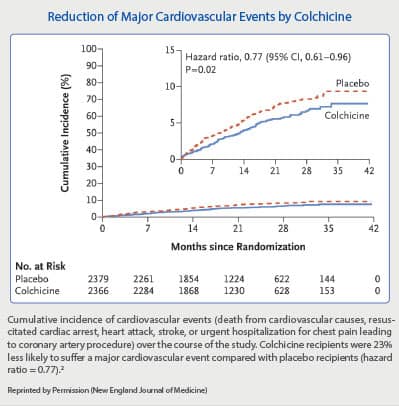Life Extension Magazine®
Most people don’t know that 30 days after a heart attack, there is a high risk of suffering a stroke.
These post-heart attack strokes are more lethal than seen in typical stroke patients.
During the first three years after suffering a heart attack, the stroke risk remains 2-3 times higher than expected before dropping back to normal.1
A major, placebo-controlled study published in the New England Journal of Medicine evaluated patients who had a recent heart attack and were then given 0.5 mg of colchicine daily.
The first data set showed that colchicine reduced risk of having another major cardiovascular event by 23%.2
The most significant data showed that heart attack patients receiving colchicine cut their stroke incidence by an astonishing 74%.2
People who have heart disease or who have suffered a heart attack should discuss colchicine with their doctor.
Underlying Cause of Vascular Disease

Atherosclerosis, the hardening and narrowing of the arteries, is the underlying cause of most heart attacks and strokes.
Chronic inflammation plays an important role in the development of atherosclerosis.3
Scientists conducted research on an established prescription drug, colchicine, an anti-inflammatory medication commonly used to treat gout and pericarditis.
Studies have demonstrated that in low doses, it may reduce the risk of cardiovascular events like stroke and heart attack.2,4
Testing Colchicine
Colchicine is a compound originally extracted from the autumn crocus and the flame lily plants.
It has been used for centuries to reduce soreness and swelling and was approved as a prescription medication in the U.S. in 1961.5
Scientists have been studying its anti-inflammatory properties to see if it could help treat atherosclerosis and resulting heart disease.
Researchers at Canada’s Montreal Heart Institute recently conducted a major trial and published the results in the New England Journal of Medicine.
The patients studied had suffered a heart attack within the previous 30 days (13.5 days, on average, between heart attack and the initiation of colchicine treatment).2
All the patients had been treated according to standard guidelines (including intensive use of cholesterol-lowering statin drugs) and had already completed any invasive procedures, like cardiac stents.2
Patients from 167 medical centers in 12 countries were enrolled in the trial.
They were randomly assigned to receive either 0.5 mg/day of colchicine or a placebo. Neither the subjects nor the doctors knew whether the patients were taking active medication or placebo.
When the trial began, 2,366 patients were assigned to the colchicine group, and 2,379 to the placebo group.
After starting treatment patients were followed for a median of 22.6 months.
A Clear Benefit

Researchers were studying colchicine’s impact on major cardiovascular events, which they defined as any of the following:2
- Death from cardiovascular causes,
- Resuscitation after cardiac arrest,
- A new heart attack,
- Stroke, or
- Urgent hospitalization for chest pain leading to stent placement or bypass surgery.
In the placebo group, a major cardiovascular event occurred in 7.1% of patients. In the colchicine group, such an event occurred in 5.5% of subjects.2
This means that colchicine recipients were 23% less likely to have a major event compared with placebo recipients.
Most dramatically, colchicine recipients had a 74% lower risk of stroke, and a 50% reduction in the risk of chest pain leading to hospitalization.2
The History of Colchicine
Colchicine is a compound originally extracted from the autumn crocus but also obtainable from the flame lily. It has been used since at least 1,500 BCE against rheumatism and swelling.2,9,10
It is widely prescribed to treat gout (a form of arthritis) and pericarditis (inflammation of tissue surrounding the heart).
A potent anti-inflammatory, it works by suppressing intracellular machinery involved in the inflammation processes.11-13
The most common side effects of colchicine are gastrointestinal, including diarrhea, vomiting, and nausea. Other side effects that occur less commonly are fatigue, headache, throat pain, and possible endocrine or metabolic effects.14
Studies have demonstrated that in low doses, it reduces the risk of cardiovascular events like stroke and heart attack.2,4
Side Effects
Colchicine is a powerful prescription drug and it isn’t for everyone.
Overall, side effects were reported in 16% of colchicine recipients and 15.8% of placebo subjects, an insignificant difference.2
Diarrhea and flatulence side effects occurred in more colchicine recipients than in those receiving a placebo.2
Pneumonia was a rare side effect, though the risk was slightly more than doubled with colchicine compared to a placebo.2
What Other Studies Showed
Previous studies have demonstrated similar benefits in people with pre-existing heart disease. Among them:
- A 2007 study in patients with stable coronary artery disease showed that 0.5 mg of colchicine taken twice daily significantly decreased the inflammatory marker C-reactive protein, showing how colchicine lowers the inflammation that contributes to heart disease.6
- A 2015 study on a similar group of patients revealed that1 mg of colchicine followed by another 0.5 mg dose one hour later significantly reduced levels of highly inflammatory cytokines (signaling proteins) produced in the heart during cardiac catheterization.7
- A 2015 analysis of five randomized, controlled trIals involving 1,301 patients showed that 0.5 mg/day to 1 mg/day of colchicine reduced the risk of coronary artery disease, stroke, or acute coronary syndrome by 56% compared with a placebo.8
All these studies, including the recent paper published in the New England Journal of Medicine, provide evidence that colchicine’s anti-inflammatory properties protect the heart and lower the risk of cardiovascular events.
Summary

Scientists have turned to colchicine, as a possible treatment for people with atherosclerosis and heart disease.
A new study has confirmed that colchicine is effective in preventing cardiovascular events—including stroke, new heart attack, and angina (chest pain)—in patients who have recently suffered a heart attack.
This comes on the heels of other studies that suggest a similar benefit.
Colchicine is a potent prescription medication. Most studies suggest that low doses of 0.5 mg/day are safe and effective, though a small number of people may experience side effects.
People with heart disease or at risk for a heart attack or stroke may wish to discuss low-dose colchicine with their doctors.
If you have any questions on the scientific content of this article, please call a Life Extension® Wellness Specialist at 1-866-864-3027.
References
- Witt BJ, Brown RD, Jr., Jacobsen SJ, et al. A community-based study of stroke incidence after myocardial infarction. Ann Intern Med. 2005 Dec 6;143(11):785-92.
- Tardif JC, Kouz S, Waters DD, et al. Efficacy and Safety of Low-Dose Colchicine after Myocardial Infarction. N Engl J Med. 2019 Dec 26;381(26):2497-505.
- Hansson GK. Inflammation, atherosclerosis, and coronary artery disease. N Engl J Med. 2005 Apr 21;352(16):1685-95.
- Nidorf SM, Eikelboom JW, Budgeon CA, et al. Low-dose colchicine for secondary prevention of cardiovascular disease. J Am Coll Cardiol. 2013 Jan 29;61(4):404-10.
- Available at: https://www.ncbi.nlm.nih.gov/books/NBK548068/. Accessed May 20, 2020.
- Nidorf M, Thompson PL. Effect of colchicine (0.5 mg twice daily) on high-sensitivity C-reactive protein independent of aspirin and atorvastatin in patients with stable coronary artery disease. Am J Cardiol. 2007 Mar 15;99(6):805-7.
- Martinez GJ, Robertson S, Barraclough J, et al. Colchicine Acutely Suppresses Local Cardiac Production of Inflammatory Cytokines in Patients With an Acute Coronary Syndrome. J Am Heart Assoc. 2015 Aug 24;4(8):e002128.
- Verma S, Eikelboom JW, Nidorf SM, et al. Colchicine in cardiac disease: a systematic review and meta-analysis of randomized controlled trials. BMC Cardiovasc Disord. 2015 Aug 29;15:96.
- Wall WJ. The Search for Human Chromosomes: A History of Discovery. Springer; 2015.
- Graham W, Roberts JB. Intravenous colchicine in the management of gouty arthritis. Ann Rheum Dis. 1953 Mar;12(1):16-9.
- Ravelli RB, Gigant B, Curmi PA, et al. Insight into tubulin regulation from a complex with colchicine and a stathmin-like domain. Nature. 2004 Mar 11;428(6979):198-202.
- Perico N, Ostermann D, Bontempeill M, et al. Colchicine interferes with L-selectin and leukocyte function-associated antigen-1 expression on human T lymphocytes and inhibits T cell activation. J Am Soc Nephrol. 1996 Apr;7(4):594-601.
- Pope RM, Tschopp J. The role of interleukin-1 and the inflammasome in gout: implications for therapy. Arthritis Rheum. 2007 Oct;56(10):3183-8.
- Available at: https://www.mayoclinic.org/drugs-supplements/colchicine-oral-route/side-effects/drg-20067653. Accessed May 22, 2020.

